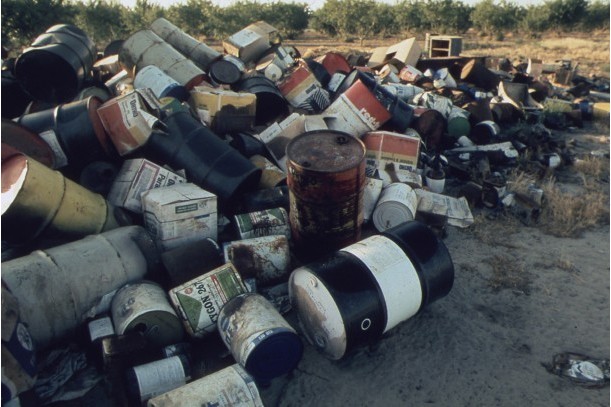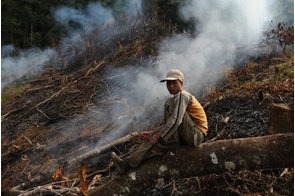How to ensure sustainable management of agricultural wastes

Summary
Indiscriminate burning of agricultural land is a major contributor to air pollution which kills up to 6.35 million adults annually and about 650,000 children across the globe, according to the WHO.
The challenge of rapid global population growth is not limited to increasing demand for food; it has been attended by an unprecedented surge in waste generation. Global waste has been estimated to reach over three billion tonnes by 2050. Currently, over two billion tonnes of solid wastes are generated annually, worldwide. In low-income countries, according to the World Bank, waste generation is expected to rise by at least 40 percent. Agriculture accounts for a significant portion of these figures.
Agricultural wastes are unwanted substances obtained from agricultural operations on crop farms, poultry and livestock production, slaughterhouses and farm processing facilities. Wastes emanating from these sources include crop production wastes such as corn stalks, husks, flesh and seeds from fruits, and vegetables. Animal production wastes include manure, slurry, carcasses, beddings and litters, broken water and feeding troughs; while food and meat processing wastes include bones, feathers, and waste during food processing and packaging. Hazardous agricultural wastes include remains of pesticides and fertilizers and their plastics; on-farm medical wastes are expired worm expellers, disposable syringes, and vaccine containers. Chemical wastes include remains of insecticides, fertilizers, herbicides and their containers. The list is endless.
Although wastes are mostly disposed on landfills globally, a reasonable portion of wastes is recovered by recycling or composting. According to the World Bank, 19 percent of wastes are reused by recycling or composting while 11 percent of waste is incinerated. Also, about 8 percent of waste is disposed in sanitary landfills with gas collection systems. These situations are mostly found in developed countries. In low-income countries around the world, as much as 93 percent of wastes are indiscriminately disposed by open dumping, mostly burnt without proper channelling of emitted gases and fumes, which results in environmental pollution. Meanwhile, agriculture accounts for about 21 percent of greenhouse gases which exacerbate the impact of climate change.
Pollutions that could arise when agricultural wastes are not properly managed, including air pollution through the release of toxic gases, soil contamination as harmful agents find their way underground, and water pollution as toxic residues contaminate water bodies and aquatic lives. Leaving agro-industrial wastes untreated and underutilized have negative health and environmental implications. Indiscriminate burning is not limited to wastes on landfills, many farmers use burning as a cheap method of clearing land to eliminate unwanted trees, weeds, and other substances in preparation for another planting season.
These harmful practices should be strongly discouraged. Open fires generate huge amounts of carbon, thereby threatening human and environmental health. Some of the diseases that could be triggered by inhaling toxic fumes include lungs and heart diseases, respiratory disorders, and cancers. Worse still, indiscriminate burning of agricultural land is a major contributor to air pollution which kills up to 6.35 million adults annually and about 650,000 children across the globe, according to the World Health Organisation. Buttressing the impact of burning on the environment, the United Nations Environment Programme (UNEP) in a recently published report titled, “Toxic blaze: the true cost of crop burning”, stated that carbon produced through open burning is 460 – 1,500 times higher in its tendency to escalate global warming than the widely known carbon dioxide.
Agriculture is a highly essential sector for economic growth, providing food, income and employment in every country across the globe. The sector reduces poverty by raising the income of millions of people in rural and urban communities and developed and developing regions of the world. As we push for greater agricultural productivity to make more food available and achieve zero hunger, we must find and enforce ways to sustainably manage the garbage. Sustainable management of agricultural wastes involves adequate planning, installation of components to prevent pollution in incinerators and landfills, and efficient use of by-products.
Nowadays, there are innovative waste management techniques to reduce negative impact on the environment, human and animal health while promoting sustainable production and consumption. The global post-harvest processing, retailing and consumer level wastages, accounting for about 40 percent of food loss or waste, mostly rotten and trashed vegetal wastes, can be reprocessed to generate renewable energy. Enzymatic or microbial digestion of vegetal wastes (rotten peels, shells, discarded portions of vegetables), known as biomass, is a well-accepted strategy for waste utilization. Bio-fuels, which refer to fuels such as biogas, biodiesel or ethanol produced from organic wastes, have promising environmental and social impacts if policy measures are introduced to promote their production.
Agricultural wastes such as manure from poultry or livestock, animal beddings, kitchen scraps and other organic wastes can be converted to compost. The heat produced during the process of waste conversion by microbes as they generate energy from carbon in organic waste, breaks it into a more useful form, thereby reducing the volume of waste and eliminating harmful pathogens. Composting organic wastes improves soil health, retains moisture, promotes the activities of beneficial microbes; it also helps to improve soil fertility, thereby reducing the need for chemical fertilizers, leading to overall reduction in greenhouse gas emissions and carbon footprints.
There is a need to educate farmers on the dangers of reckless disposal of toxic farm chemicals and other farm wastes. Most of them are ignorant of the long-term health and environmental implications of exposure to harmful by-products. Another hindrance to effective waste management is the absence of a central waste collection system in many developing nations. The situation is worse in rural communities where people dump wastes indiscriminately or get rid of them in harmful ways. Majority of agricultural activities take place in these rural communities. Therefore, efforts should be geared towards providing waste management plans and facilities in such areas.
One critical step in the right direction for effective waste management in the developing world would be for government and non-governmental agencies involved in waste management to encourage farmers and households to selectively discard waste. Some wastes are biodegradable while others are not. Sensitizing the public to classify wastes into these categories before they are trashed can ensure appropriate collection and management by waste collection companies.
Biodegradable wastes include kitchen wastes from food items, vegetables, fruits, fish, livestock and poultry products; other biodegradable items are cartons, paper, worn out clothes, shoes and so on. Non-biodegradable wastes include metallic cans, plastics, pesticides and other chemicals that cannot be easily decomposed. Industrial and technological advancements have, however, made it possible for some non-biodegradable wastes to be recycled. Selective trashing of wastes can ease waste utilization and reduce pollution.
As much as possible, waste generation must be controlled to the barest minimum. Poor or epileptic power supply makes it difficult to preserve agricultural products leading of spoilage and waste generation becomes inevitable. Stable power supply can facilitate the setting up of cold storage facilities in farming communities to improve the shelf life of perishable agricultural products. Provision of drying equipment and improved access of farmers to storage facilities will also preserve food items and reduce wastage.
Households can also reduce the wastage of agricultural and food items by controlling their purchases. Buying quantities that can be easily consumed within a given period before spoilage sets in can limit the need to trash food items. Proper meal plan based on family size can help to ensure that excess raw food items are not cooked which can further prolong their shelf life.
Sensitization of farmers, agro-allied industries and the general public on waste management, proper waste classification and collection system, efficient waste treatment systems, adequate utilization of organic wastes in the production of biogas, ethanol, and other by-products, as well as ensuring the presence of stable electricity in both rural and urban areas of sub-Saharan Africa and Asia by concerned authorities can collectively put us on the track to efficiently control, manage and utilize agricultural wastes as we work towards expanding food production, distribution and consumption.
Mojisola Karigidi, a Financial Nigeria Columnist, is a Nigerian biochemist and the founder and product developer at Moepelorse Bio Resources. She is also a Global Innovation Through Science and Technology (GIST) awardee, and an Aspen New Voices fellow.
Related
-
Cameroon to boost agriculture, infrastructure, income with AfDB loan
The AfDB financing will support Cameroon’s Agricultural Value Chain Development Project.
-
Researchers advocate changes in small-scale farming methods to prevent biodiversity losses
The researchers say agricultural practices of small-scale farmers are environmentally unfriendly.
-
Green Climate Fund approves $151 million for disbursement by AfDB
The approval comprises a $90.7 million grant and a $60.3 million loan.









